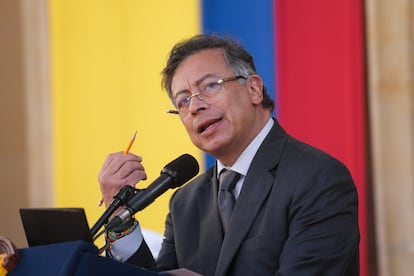The US military campaign against vessels crewed by civilians allegedly involved in drug trafficking continued this Tuesday with two new extrajudicial attacks, bringing the number of reported operations to nine since September. The novelty this time is that both occurred in the waters of the Pacific Ocean, at least one off the Colombian coast, and not, like the previous ones, in the Caribbean Sea. The attacks, in which five people died, come amid the confrontation between US President Donald Trump and Colombian President Gustavo Petro over the military campaign against drug trafficking launched by Washington.
“These attacks will continue, day after day. These are not simply drug traffickers, but narco-terrorists who sow death and destruction in our cities. These drug traffickers are the al-Qaeda of our hemisphere and they will not escape justice. We will find them and eliminate them until the threat to the American people is extinguished,” wrote Secretary of Defense Pete Hegseth in a message accompanying the second announcement, later that evening. The attack took place in the “Eastern Pacific” on “a known drug trafficking route.”
At noon (EST), CBS announced the first operation, citing two anonymous official sources. Confirmation came shortly afterward from Hegseth himself. The death toll from the nine extrajudicial operations is at least 37 civilians.
In X's posts, the Secretary of Defense also released a video of the moment the vessels exploded into the air."These cartels are waging war on our border and our people. There will be no sanctuary or forgiveness, only justice," he added in the first video, without offering further details about the identity of those traveling aboard the vessel or evidence of their cargo. He also said the order had been given by President Donald Trump.
The attack reported at midday also marked a turning point. It was also the first time that US authorities acknowledged that the attack took place"off the coast of Colombia." On previous occasions, Hegseth and Trump had emphasized the proximity of the Venezuelan Caribbean coast to the Caribbean. According to official figures, only 10% of the drugs that reach US shores do so through the Caribbean. The most common route is the Pacific, with three main origins: Mexico, Colombia, and Ecuador.
The Secretary of Defense's remarks must be placed in the context of the conflict between Trump and Colombian President Gustavo Petro, whom he has accused of being a"drug trafficking leader" who encourages mass drug production. Petro said Washington had violated his country's sovereignty in two of the nine attacks on vessels believed to be Colombian. The White House stated that it would cut off all aid to the country and threatened punitive tariffs against Bogotá, which have not been implemented.
This Wednesday, the clash between the two leaders escalated: Trump called Petro a"thug" and "a bad guy" at a press conference in Washington."He produces a lot of drugs. Today we suspended all payments to Colombia. He should be careful, or we will take very severe measures against him and his country."

The announcement comes two days after Hegseth himself—and not, as has also been customary, Trump—broke the news of the seventh attack on Sunday. The target was a vessel that US authorities link to the National Liberation Army, a Colombian guerrilla group that the United States has considered a terrorist organization since the 1990s. In a post on X, he alleged that the vessel “was navigating a known drug trafficking route and transporting substantial quantities of narcotics.” Three people were killed.
The Secretary of Defense also stated that the operation, which targeted Colombia, not Venezuela as previously stated, took place in international waters and within the area of responsibility of the United States Southern Command, which includes the Caribbean Sea. An unprecedented deployment has taken place in that area in recent weeks, involving a dozen warships, including a nuclear submarine, and some 10,000 troops.
“Armed attacks”
The Trump administration considers the United States to be engaged in a"non-international armed conflict" with drug cartels. Arguing that the narcotics trafficked by these criminal gangs kill tens of thousands of Americans each year, they classify these alleged drug movements as"armed attacks."
Senators from both parties oppose Trump's declaration of war against these organizations, rather than a country, and his invoking a 1970s law that gives him the power to continue these operations without congressional approval for 60 days. The law expires in early November and can be extended for another 30 days.

Over the weekend, the US president also confirmed the sixth extrajudicial operation in a campaign that began in early September. This time, the target was a shallow submersible vessel. The military killed two civilians, and two others, a Colombian and an Ecuadorian, survived.
Both were repatriated to their countries, and the Ecuadorian is now free, since the Prosecutor's Office of that country did not find evidence to accuse him of any crime.
US authorities have yet to provide evidence regarding the crew members of these vessels or the cargo they were carrying. The death penalty is legal in much of the United States, although it is never used for drug trafficking, and a trial is always required.

